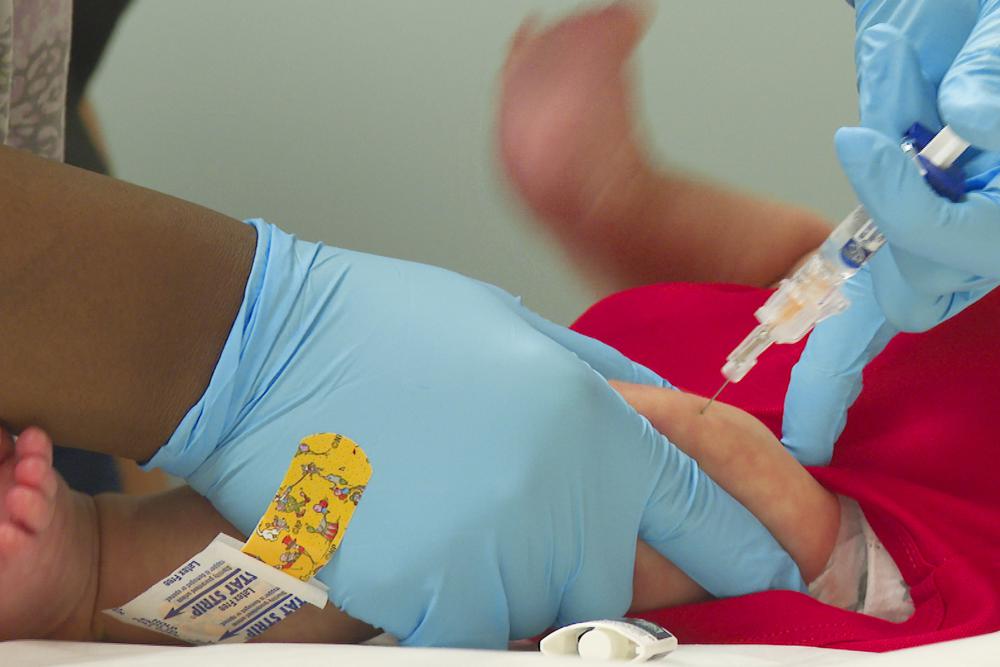A number of scientists have wondered if aluminum, a vaccine additive that has been used for decades, had a role in allergies and asthma in children.
A new federally funded study has found a possible link, but experts say the research has important shortcomings and is not a reason to change current vaccine recommendations. The study doesn’t claim aluminum causes the breathing condition, and officials say more work is needed to try to confirm any connection, which hadn’t been seen in earlier research.
Even if a link were ever found, the life-saving benefits of the vaccines are still likely to outweigh the asthma risk, said Dr. Matthew Daley, the study’s lead author. But it’s possible that if the results are confirmed, it could prompt new work to redesign vaccines, he added.
Dr. Paul Offit, of Children’s Hospital of Philadelphia, worried that the flawed study will needlessly scare some families away from proven vaccines.
“Making an extraordinary claim requires extraordinary evidence,” Offit said. This study does not offer that kind of evidence, he said.
He and other outside experts noted that Daley and his colleagues were unable to account for the effects of some potentially important ways children are exposed to aluminum — such as in the air or through their diet.
They also noted the findings include hard-to-explain inconsistencies, like why, in one subset of thousands of fully vaccinated kids, more aluminum exposure didn’t seem to result in a higher asthma risk.
CDC officials, in a statement, said it appears that aluminum-containing vaccines “do not account for the overall trends that we see.”
The study, released Tuesday, suggests that young children who were vaccinated with most or all of the recommended aluminum-containing vaccines had at least a 36% higher risk of being diagnosed with persistent asthma than kids who got fewer vaccines.
Aluminum has been used in some vaccines since the 1930s, as an ingredient — called an adjuvant — that provokes stronger immune protection.
By age 2, children should be vaccinated against 15 diseases, according to U.S. recommendations. Aluminum adjuvants are in vaccines for seven of them.
Aluminum adjuvants have long been considered safe and effective. Still, scientists noted a period of increased rates in allergies and asthma among U.S. children during a 30-year period starting in about 1980, and some wondered if there was a connection. (Those rates leveled off starting about a decade ago and have declined somewhat in recent years, for reasons not fully understood.)
Several previous studies didn’t find a link between aluminum-containing childhood vaccines and allergies and asthma. But other research has linked aluminum in industrial workplaces to asthma. And mice injected with aluminum suffer an immune system reaction that causes the kind of airway inflammation seen in childhood asthma.
“Based on what I consider limited animal data, there is a theoretical risk that the aluminum in vaccines could influence allergy risk,” said Daley, an associate professor of pediatrics at the University of Colorado School of Medicine.
In 2013, the Institute of Medicine — now known as the National Academy of Medicine — called for more federal research into the safety of childhood vaccines, including their use of aluminum.
The new study is part of the government response to that call, Daley said. It was funded by the CDC, and included current and former CDC staffers among its authors. It was published by the medical journal Academic Pediatrics.
The researchers focused on about 327,000 U.S. children born from 2008 to 2014, looking at whether they got vaccines containing aluminum before age 2 and whether they developed persistent asthma between ages 2 and 5.
Asthma, a condition that can cause spasms in the lungs, usually results from an allergic reaction. About 4% of U.S. children under 5 have persistent asthma.
The researchers took steps to try to account for different factors that might influence the results, including race and ethnicity, whether kids were born premature or whether children had food allergies or certain other conditions.
But there were many other factors they were unable to address. For example, aluminum can routinely be found in breastmilk, infant formula and food, but the researchers were unable to get data on how much aluminum the kids got from eating. They also had no information on aluminum exposures from the air and environment where the children lived.
The researchers split the study group into two. One was about 14,000 kids who developed eczema, a skin condition that is seen as an early indicator for the development of asthma or other allergic diseases. They wanted to see if kids with eczema were more or less sensitive to aluminum in vaccines, compared with children who did not have early eczema. The other 312,000 or so kids in the study did not have early eczema.
Both groups got roughly the same amount of vaccine-related aluminum. The researchers found that for each milligram of aluminum received through vaccines, the risk of persistent asthma rose 26% in the eczema kids and 19% in kids who did not have eczema.
Overall, kids who got 3 milligrams or more of vaccine-related aluminum had at least a 36% higher risk of developing persistent asthma than kids who got less than 3, Daley said.
Offit said the study’s limitations meant that the work has “added nothing to our understanding of vaccines and asthma.”
But other experts said the researchers drew from a respected set of patient data and worked carefully with the best information that was available.
“This is public health at its best. They are making every effort to find any possible signal that may be a concern,” said Michael Osterholm, director of the University of Minnesota’s Center for Infectious Disease Research and Policy. “It’s our job to exhaustively examine that to see if that’s true.”
He acknowledged anti-vaccine activists will likely jump to conclusions that the evidence doesn’t support. But if CDC had the information and didn’t publish it, the agency might be seen as misleading the public, further eroding trust, he said.
Dr. Sarah Long, professor of pediatrics at the Drexel University College of Medicine, echoed that.
“I believe in complete transparency,” she said. “If you’ve asked a question and here spent our (taxpayer) money to (investigate) that question, I think the results should be aired in all of its warts and glory.”
(AP)












9 Responses
Their problem is that almost all children in the world get the vaccines, but only a small number develop asthma.
It is truly rare to see a study showing anything at all possibly wrong with childhood vaccines. They’ve always been unquestionable and infallible.
This despite the fact that studies such as this one have NEVER been done and the few that have, have been terribly flawed in favor of vaccination. Remember: Numbers don’t lie- but liars use numbers.
Opponents of vaccines- or rather people who insist on vaccine safety, accountability and transparency, have long said that more studies were needed to study the cumulative effect of many many doses of immune stimulating poison on kids.
It’s not just the aluminum- although it’s not particularly healthy. It’s the immune response, artificially stimulating the immune system with adjuvants like aluminum, which irritate a system we know not nearly enough about. Especially at a time where auto immune diseases have been skyrocketing and more kids than ever have chronic sicknesses.
My older kids were fully vaxxed and were always sick. Constantly coming down with something or the other and prone to ridiculous fevers . My younger kids are not and they rarely if ever get sick.
Here we have a study showing nearly 40% increase in just ONE inflammatory illness, and still they’re urging to ignore the study and ignore the results because they’re not good enough and vaccines are still amazingly awesome and totally perfect. There is one question I don’t believe has ever been truly answered. Are vaccinated kids HEALTHIER
Not, are they immune to 15 (of infinite) diseases . Are they better off in the long run.
CONSPIRACY THEORISTS!!
Now, i’m wondering if Psoriasis, actually comes from the vaccines of childhood!
We’ll never know, or prove either way. It’s VERY scary!
And the worst part is that, anytime anyone says anything against vaccines, they immediately, get shut up and shut down. Probably ALL, or most, of auto-immune diseases actually come from vaccines. But, the Drs will always have an excuse – “we don’t believe in alternative medicines” etc….
And their favorite line is: “you probably just suffer from a chronic ‘genetic’ disease”. ya, just blame the family – easiest way out Dr!
Why don’t you try googling how much Dr Paul Offit has profited from vaccines. Fascinating results.
So the anti-vaxx nutcases have given up on autism, and have moved on to two other A- illnesses, asthma and allergies. In thirty years, when any connection has been thoroughly disproven, they can move on to the B- illnesses, and so through the alphabet. They will never admit that the standard childhood vaccines are SAFE.
Mulhouse doesn’t realize that this study was done by his own government
Not the so called conspiracy theorists who just love being proven right time and time again
And no nobody ever said ONLY autism was caused by vaccines (even though I PERSONALLY have a friend who’s perfectly normal five year old became severely autistic the day after his MMR- he was in School with my nephew learning aleph bet and now has a full time aide.)
Us conspiracy theorists have plenty of evidence linking not just autism but allergies , eczema, adhd, Asthma just to name a few. By the way, two of my relatives (adults) developed eczema weeks after getting dtap shots.
Dear Milhouse.
We “anti-vaxx nutcases” only ask one thing: show us the research that proves that “the standard childhood vaccines are SAFE”.
And if you can’t, then explain why its never been done.